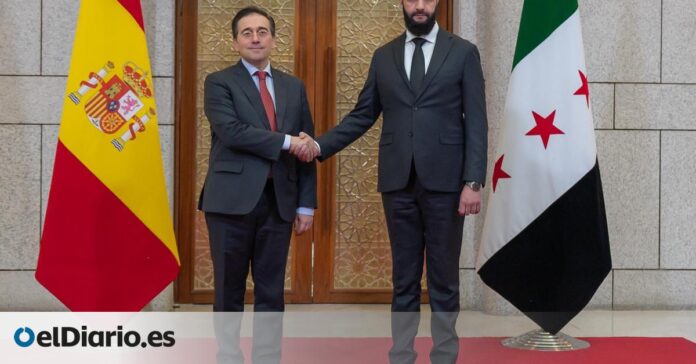
Spain has defended the “gradual lifting” of sanctions against Syria following the fall of the al-Assad regime. Spain’s Foreign Minister José Manuel Álvarez is the country’s de facto president and leader of the jihadist coalition that took power on December 8, Ahmed al-Shallah (Abu Mohammad al-Jolani). After the meeting, he made the following statement.
Al-Al, head of the Islamist Organization for the Liberation of the Levant (HTS), formerly al-Qaeda in Syria and classified as a terrorist group by the United Nations Security Council and countries including the United States, Turkey, the United Kingdom, and the European Union, Schaller is trying. The more he opens the doors of the People’s Palace to foreign reporters accompanying Western leaders, who were symbols of the old regime, the more moderate he appears to be.
There, amidst the imposing gray mass, where a soft red carpet is laid out, sometimes by two employees, diligently combing it to ensure a uniform color, Al-Sharah will be hosting his guests this Thursday, including ministers. We welcomed the head of Spain’s foreign affairs, surrounded by his team. All Ministry of Foreign Affairs employees, none of whom were women, wore suits and ties. It is a kind of “blazer diplomacy” that former European foreign affairs chief Josep Borrell once referred to.
“Our position is that sanctions must be lifted gradually,” Álvarez told a press conference at Beirut’s People’s Palace on what the Spanish government would defend at the next meeting of EU foreign ministers on January 27. said. We will see what decisions are made regarding the path taken in the new changes in Syria, but for now we are in favor of reconsidering the progressive uprising. I am doing it. ”
International allies such as the European Union and the United States have imposed sanctions on Syria since the 2011 protests against al-Assad. In total, 27 countries punished 318 individuals and 86 entities (blocking their funds and banning them from entering their territory).
UN High Commissioner for Human Rights Volker Turk this Wednesday too called on the international community to reconsider the sanctions imposed on Syria, as they affect all Syrians.
“We need unanimity to lift sanctions,” Alvarez explained. “I’m speaking on behalf of Spain, but I’m also speaking with different countries here in Damascus who are in contact with the new authorities and the major European countries involved.”At least we all share the same vision. I am. We must be able to help the Syrian people, and we must be able to provide a future for the Syrian people, both those here now and the millions of refugees. [en torno a 7 millones]”.
In this sense, the Minister announced various items totaling 10 million euros in support to the new Syrian government. “We have already donated 100 million euros in humanitarian aid in recent years through various mechanisms, where 50 million will be given to the Syrian people and a further 50 to Syrian refugees in the region.Today, I would like to announce that the new authorities This year, we announced that we have already set aside 6 million euros in initial humanitarian aid for 2025.
“There is also an urgent need for food in Syria,” Alvarez continued. “That is why I proposed to allocate 1.6 million euros as a first round of food aid through the Grain Program for Ukraine and the World Food Programme.On the one hand, we will support Ukraine by purchasing grain. And it’s also helping to alleviate the incredibly terrible food situation here in Syria.”
Alvarez also announced an “initial package of 3 million euros through regional actors such as UNHCR (United Nations High Commissioner for Refugees) and ICRC (International Committee of the Red Cross)”.














